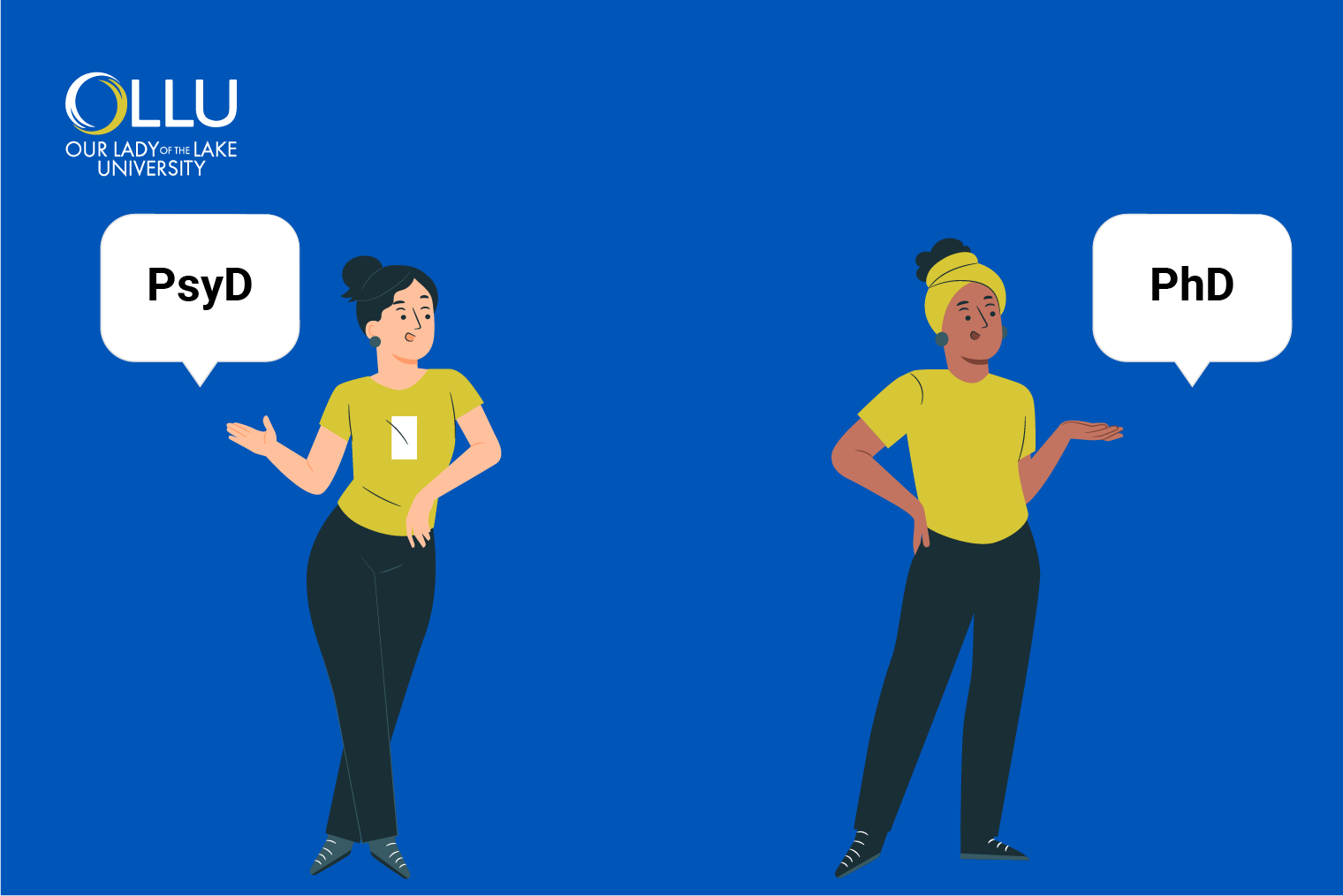PsyD vs. PhD: Which Is Right for Me?
Jun 05, 2024

Committing to a doctorate in psychology can significantly impact your career trajectory. While both PsyD and PhD degrees offer rigorous academic training and prepare you for a career in psychology, there are significant differences between the two.
In this comprehensive guide, we'll explore the key differences between PsyD and PhD programs in psychology, shed light on the unique features of each, and provide insight into how to choose between the two. Whether you're a graduate looking to further your education and training or an aspiring psychologist exploring the educational paths within the field, understanding the nuances between these terminal degrees is crucial for charting a career in psychology.
Understanding the Basics
PsyD and PhD in psychology are the highest level academic degrees that can lead to a career as a psychologist. However, while PsyD graduates can pursue clinical practice in hospitals, counseling centers, or private practices, PhD graduates often focus on careers in academia and research institutions. Both degrees require extensive coursework and supervised training, but the balance between clinical practice and research varies.
What is a PsyD in Psychology?
A PsyD is a doctoral degree that focuses on the practical application of psychology. While some research is involved, the primary focus is clinical training and hands-on experience. This program prepares you to work directly with individuals, couples, families, and groups to improve their mental health and overall well-being.
What is a PhD in Psychology?
A PhD in psychology is a doctoral-level degree that emphasizes research and the advancement of knowledge in psychology. This program primarily focuses on training students in scientific research within general psychology or in a concentration.
PsyD vs. PhD: Understanding the Key Differences

Let's delve into the key differences between PsyD and PhD degrees in psychology.
1. Program length and requirements
A key distinction between PsyD and PhD degrees is the time and effort involved in each. In general, PsyD degrees take four to six years to complete, whereas PhD degrees take about five to eight years to complete. This difference in durations is due to the more rigorous PhD degree program.
While the prerequisites for applying to PsyD and PhD programs are similar, they may differ across educational institutions. Common requirements for applying to a doctoral-level program typically include:
- A bachelor's degree in psychology or a relevant field
- Undergraduate GPA 3.0 or higher
- GRE scores
- Letters of recommendation from professors or supervisors with whom you've worked in psychology-related jobs
- Personal statement
- CV or resume
- Official transcripts from your undergraduate studies institution.
Remember that some schools don't require a master's degree in psychology or a related field and offer combined master's/doctoral programs for students with only bachelor's degrees.
2. Focus and training
Another significant difference between the two degrees is that PhDs emphasize research, whereas PsyDs prepare you for practicing psychology. Therefore, PsyD programs focus on applying scientific knowledge directly to the practice of psychology and involve courses on human behavior, mental health conditions, and therapy.
On the other hand, PhD programs study the theories behind psychology and involve coursework like research methodology and statistical models. While there's an overlap between research and clinical practice, it's limited.
3. Clinical experience
The clinical experience components of PsyD and PhD programs in psychology vary in their structure and focus. As part of the PsyD degree program, candidates must complete one year of internship and at least 1000 hours of service hours in practicum experience in hospitals, schools, universities, or community agencies under the supervision of on-site licensed psychologists and faculty. Furthermore, most states require an additional one to two years of supervised practice for licensure. During this period, PsyD candidates develop the clinical competence to work with diverse populations and various mental health issues. On the other hand, PhD candidates engage in hands-on learning in lab or academic settings instead of a clinic or hospital.
4. Career paths
Before practicing as psychologists, both PsyD and PhD graduates must obtain state licensing. One of the main requirements for licensure is a passing score on the Examination for Professional Practice in Psychology (EPPP). Additionally, graduates can obtain subfield certification through the American Board of Professional Psychology (ABPP).
The typical career paths after earning a PsyD in psychology and becoming licensed include:
- Clinical psychologist
- School psychologist
- Private practice psychologist
- Counseling psychologist
- Psychotherapist
- Forensic psychologist
- Military psychologist
- Engineering psychologist.
On the other hand, career opportunities with a PhD depend on the specific research area of the doctoral program, which can be clinical psychology, forensic psychology, and cognitive behavioral psychology. Typical destinations for PhD graduates include:
- Researcher
- College or university professor
- Licensed psychologist.
The work environment for psychologists varies depending on where they work. PsyD graduates work primarily with patients in schools, counseling centers, hospitals, correctional facilities, private clinics, etc. On the other hand, PhD graduates typically work in universities, government agencies, and non-governmental organizations.
5. Skill sets and traits for success
Success in psychology doctoral programs requires a unique set of skills and traits. Whether pursuing a PsyD or a PhD, genuine passion for the field is essential for motivation throughout the program. However, in particular, the main skills and traits needed in PsyD programs include:
- Clinical skills
- Time management
- Ethical decision-making
- Resilience.
On the other hand, the key skills and traits needed in PhD programs include the following:
- Problem-solving abilities
- Research skills
- Writing skills.
6. Financial considerations
According to a recent report, the average cost of a PhD is $81,900. On the bright side, PhD programs often offer tuition waivers and stipends in exchange for teaching or research assistance. On the other hand, while tuition coverage for PsyD programs is rare, some institutions can offer possible stipends through assistantships. The average tuition cost of PsyD programs in online institutions is $4,330 per course. Meanwhile, at OLLU, our tuition costs $3,162 per course with possible financial aid.
As PsyD studies are shorter, graduates may start earning a salary sooner than PhD students. However, PhD students may have an advantage as they can earn a stipend while working as teaching or research assistants in university faculties. After graduating, both PsyD and PhD graduates can pursue diverse career paths in psychology, with both degrees offering high earning potential, albeit in different settings.
Key Considerations When Choosing a Degree
Knowing which degree to pursue can take time and effort. When deciding between a PsyD and a PhD in psychology there are several factors you need to consider before making an informed decision. Some of them are:
- Career goals: It's critical to consider whether your career goals align more with clinical practice or research/academia.
- Accreditation: When choosing a doctoral degree, choosing one with American Psychological Association (APA) accreditation is crucial to ensure a quality education.
- Time commitment: You must also consider how much time you can invest in your education. A PsyD would work better for you if you're looking for a program with a shorter duration.
The Bottom Line
When deciding between PsyD and PhD programs in psychology, there isn't a one-size-fits-all answer, as each path offers distinct opportunities for growth and contribution to the field. If you're drawn to the research-driven environment of psychology, a PhD degree would be better for you. On the other hand, if you prefer psychology's practical, hands-on applications, a PsyD would be a better fit.
OLLU's Doctor of Psychology (PsyD) degree with a concentration in Counseling Psychology will prepare you for the independent practice of assessment and intervention with individuals, couples, groups, and families.
So, seize the opportunity to delve deeper and go on the path that resonates with your vision for the future. The world of psychology is yours to explore!
Frequently Asked Questions (FAQs)
Is a PsyD better than a PhD?
Neither degree is better than the other. However, one may be more suitable for you based on your career goals and aspirations. If you're interested in clinical work, a PsyD would be better for you, whereas if you want to focus on research and academia, a PhD would suit you better.
Do PhDs make more than PsyDs?
There is no definite answer, as your salary will vary depending on the setting you choose to work in. Typically, PsyD graduates earn higher pay when working as corporate or sports psychologists. On the other hand, PhD graduates earn more when leading research projects or becoming tenured postgraduate professors.
Is a PsyD harder than a PhD?
The difficulty of earning a PsyD versus a PhD depends on your strengths and preferences. If you're not comfortable working with serious psychological issues, a PsyD may be more challenging to complete for you. On the other hand, if you struggle with statistics and the scientific applications of psychology, a PhD may be more difficult for you.
Are PsyD programs shorter than PhDs?
Yes, PsyD programs are shorter than PhDs. Typically, PsyD programs take four to six years to complete, whereas PhD programs take five to eight years.